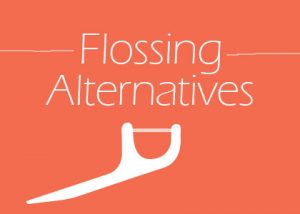 There are two kinds of people in this world: those who floss, and those who don’t. Diligent flossers everywhere inspire those of us who live with them or know them. Flossing may not be a philosophical virtue but it’s certainly high on the list of qualities amongst people who “have it together.” Read more below about why flossing is so important and what alternatives you have if you don’t like traditional floss.
There are two kinds of people in this world: those who floss, and those who don’t. Diligent flossers everywhere inspire those of us who live with them or know them. Flossing may not be a philosophical virtue but it’s certainly high on the list of qualities amongst people who “have it together.” Read more below about why flossing is so important and what alternatives you have if you don’t like traditional floss.
The Point of Flossing
After you eat, tiny pieces of food are left everywhere in your mouth. Even though your saliva does a good job of rinsing a lot of food debris away, some leftovers stay stuck on and between your teeth and gums and must be brushed and flossed to get rid of it. You do have tons of natural bacteria in your mouth that help break down food buildup, but the bacteria leave behind a sticky film on your teeth called plaque that needs to be removed.
Everyone (even young kids) should brush for two minutes, twice a day, and floss once a day to remove food buildup and plaque from the places that are hard to reach with a toothbrush. If you don’t stay on top of it, food buildup and plaque can quickly turn into bigger problems that cause tooth decay, gum disease, and inflammation in your mouth.
Flossing Alternatives
The American Dental Association (ADA) says it doesn’t matter if you floss before or after brushing your teeth, or if you floss in the morning or at night. What’s most important is that you do it every day. But what if traditional flossing is difficult for you, or you’re traveling, or if you have braces? Thankfully, you have some options that the ADA approves.
Here are some of the flossing alternatives and their uses:
- Interdental Brushes: Like tiny toothbrushes, specially designed to clean between your teeth, these brushes are a great alternative to flossing. Interdental brushes are usually easier to use than a thread of floss, are just as effective as floss, and are probably your best option if you have braces.
- Water Flossing: Approved by the ADA as a floss alternative, water flossing is just what it sounds like. Instead of a thread, water flossing uses a steady stream of water, aimed between the teeth, to clear away plaque. Water flossing uses a small, hand-held appliance that might be more physically comfortable for you.
- Dental Pick: Made of plastic or wood, these tiny sticks can help remove plaque from your teeth and gums. If you use a wooden pick, the ADA recommends getting the pick wet first to soften it. Picks aren’t quite as effective as floss, and you risk moving bacteria around in your mouth unless you use a new pick for each tooth.
- Pre-Threaded Floss: For some people, the hardest part of flossing is actually reaching the floss into the mouth and effectively moving it between the teeth. Thankfully, a pre-threaded flosser is the simple answer to this problem. You can buy these in packets and use one with one hand. Use pre-threaded floss to more easily reach in your mouth and (like regular floss) throw it away after each use.
- Soft-Picks by GUM®: A favorite of the dental community, Soft-Picks are sort of an interdental brush/dental pick hybrid. Soft-Picks are small, disposable plastic picks with a soft tip and rubbery bristles that fit comfortably between teeth and do minimal damage to the gum tissue.
A word about mouthwash: while it’s a great option for freshness and does help kill the bacteria that cause decay and gum disease in the rest of the mouth, mouthwash is not a good replacement for brushing or flossing. Mouthwash is best used in combination with these methods for optimum oral health.
Flossing & Your Health
Your daily brushing and flossing routine is the foundation of good oral hygiene and health. Remember also to see your dentist for a professional cleaning twice per year. Some plaque and buildup (like tartar) can only be removed by a dentist or hygienist. Plus, proactive oral care goes a long way toward your overall health and seeing the dentist is just as important as seeing your doctor!
If you’re looking for a Goose Creek dentist, Carolina Complete Dental is always welcoming new patients. We’d love to see you for any and all of your dental health needs.
The content of this blog is not intended to be a substitute for professional medical advice, diagnosis, or treatment. Always seek the advice of qualified health providers with questions you may have regarding medical conditions.
Carolina Complete Dental
100 Berkeley Square Ln.
Goose Creek, SC
(843) 779-9445
https://goo.gl/maps/d6XNxenrn7u
